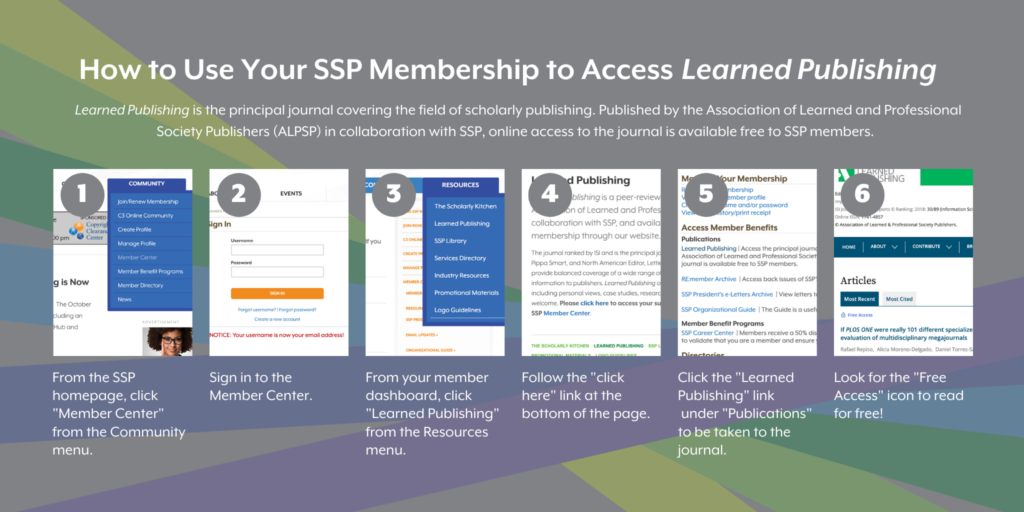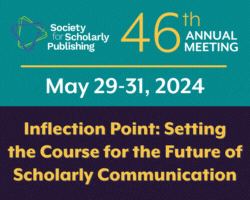
“Junior Journals in Politics and International Relations: Potential and Challenges” by Rafael Plancarte-Escobar and Max Steuer is available in Volume 35, Issue 3 of Learned Publishing. Access to Learned Publishing is a benefit of membership in SSP. You can read the full-text online.
Key points:
- Junior journals occupy an intermediate space between student and senior journals and diversify academic publishing.
- Junior journals have the potential to help reduce two undesirable trends in academic publishing: predatory publishing and the absence of diversity.
- Some of the practices followed by Politikon: The IAPSS Journal of Political Science could be increasingly employed by senior journals.
- To increase the perceived value of involvement in them, junior journals should speak to the needs of academia in general.
- The challenges junior journals face with indexing may be alleviated by establishing networks between them or by gaining the support of professional publishers.
The authors spoke to us a bit about how early mentoring and involvement can foster future talent.
What motivated you to use the experience of Politikon to illustrate the role of junior journals?
We both served in the Editorial Board of Politikon and, when managing the journal, noticed that several of its practices, such as the involvement of junior scholars in all editorial positions, differentiate it both from student and from senior journals. We noticed that there is no category that would appropriately capture the philosophy, mission and organizational structure of journals such as Politikon. Having reviewed a range of existing sources, we developed the concept of the ‘junior journal’ in which the editorial boards are composed by junior scholars but which are open to contributions by scholars regardless of academic rank and in an equal manner (no prioritization to senior scholars). In addition, we think that Politikon exhibits several other, more unique features that deserve broader attention and may yield valuable lessons for scholarly publishing: an international editorial board (of course, composed of junior scholars), and its status as an open-access, self-published journal (using the Open Journal System platform).
Do you feel that the findings from Politikon broadly apply to other journals and specialties?
In one section of our case study, we compare Politikon to other junior journals in the discipline of Politics and International Relations (there are not that many that fit these criteria). The scope of a journal contribution did not allow us to go beyond this focus, but we include a segment referring to the practice of the (primarily US-based) student-edited law reviews, and we argue that these are different because they mostly do not run double-blind peer review and their editorial boards, while typically entirely student-led, rarely if ever include PhD students and postdocs, which is a typical feature we identify with junior journals. However, there are certainly junior journals in other disciplines (even in law, for example, the Cambridge International Law Journal or the European Journal of Legal Studies), and they seem to grapple with similar challenges (indexing, open-access versus subscription-only publication, the degree of involvement of senior scholars in the journals’ advisory boards, to some extent promotion as well). Yet, there seem to be very few junior journals with international editorial boards not based at the same institution, as this considerably increases the demands for effective coordination–but we believe that also the overall value of the experience of involvement in the journal, the skills gained and, to the extent such backgrounds bring more contrasting perspectives, the diversity of the published contributions as well.
What are the advantages to publishers and the scholarly community to foster junior journals?
Junior journals can provide an important service to the community by enabling junior scholars (and here we include students) to submit to a platform where they know their contributions to be evaluated by scholars who are about the same academic generation. This can foster collegiality and remove some fears of the review process, especially for first-time authors. In addition, publishers and societies supporting junior journals would not only help the discipline advance by junior scholars getting authorial experiences, but also reviewer and editorial experiences, including in managerial roles. These might be crucial to ensure a steady supply of quality candidates for key editorial roles in senior journals, as some of these junior scholars advance their academic career to that stage. It is also clear that publishers and scholars who support junior journals are interested in the sustainability of scholarly research by fostering the training and experiences of the next generation of scholars and combine this with supporting quality research that makes an independent contribution to knowledge.
What are the obstacles to overcome in encouraging publishers and societies to launch junior journals?
There is obviously the more limited experience of junior scholars compared to senior scholars who usually sit on editorial boards. We do think that the involvement of senior scholars is necessary, but this can be in an advisory position, assisting with academic quality assurance, for example, when there are contrasting peer reviews and limited specialization on the given subject within the in-house editorial board. Secondly, junior journals might appear to be a less attractive venue to publish for senior authors–why would a senior scholar submit their piece to be reviewed by primarily junior scholars? But evidence from our case study of IAPSS Politikon shows that senior scholars do submit. Moreover, the fact that predominantly junior scholars submit is not a disadvantage if the contributions are of high quality and enable a steady flow of manuscripts and publication on schedule. Once again, indexing and professional editing support can be of help for such an outcome.
The July issue of Learned Publishing is now available! The entire issue is available as part of your SSP membership.
News contribution by SSP member Rebecca Rinehart. Rebecca is the CEO and Head of US Operations and Senior Associate for Societies and Associations with Maverick Publishing Specialists.




Join the Conversation
You must be logged in to post a comment.